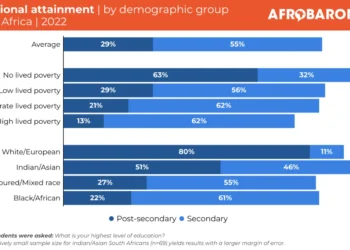And how well will you say the Nigerian school curriculum is doing to produce individuals who will either keep up with the new times or will themselves create those entirely new occupations sir?
One of the biggest questions facing schools right now is how to prepare students for the future labor market currently being restructured by emerging technologies such as Quantum computing and artificial intelligence, etc.? In a new report from the Economist Intelligence Unit, a research group affiliated with the weekly magazine, many K-12 educators said ‘they agree on the need and want to retool their teaching to match future workforce needs but feel limited by meager budgets and inadequate access to technology’. But there are also many other hidden and unaddressed reasons. Available records show that without changes in education, the future of work will leave more people behind the poverty line. Africa will need National STEM Policy and productive strategies for Upskilling Teachers, improving Communication and work messaging at all levels. Also, we need to retool and reequip our Education Infrastructure and teaching environment and tools with functional Laboratories if STEM Education must yield the quantum benefits to create wealth and sustainable knowledge value chain for our digital survivability. The future of work therefore will continue to challenge the world of learning which now witnesses tremendous change management requirements. Today, as we navigate deeper into the technology-driven ocean of the 21st century the art of learning will dictate the success of the 4th Industrial Revolution. For example, Future Schools may emerge in space very sooner than later. It simply means that more Nigerians and Africans will travel overseas to the UK, USA, Germany, Asia, and inevitably to Mars etc., to study and acquire new knowledge in the compressed technology frontier. Also, citizens of many nations of the world orbit into Space for new forms of complex knowledge and education. Those commanding new education models would be different from what is currently obtainable on Earth. It is instructive to note that future job terminologies will be different from today. For example, we expect to register:
AI Psychologists, Chief Geo-location Data Expert, Killer-Drone Directors, Mars Life Experts, Robotic Sociologists,
Mind-Messengers, Imagination-Preneurship, etc. Currently, there are many job openings out there, but no commensurate skills to fill them up. The national curriculum should focus on and ensure mandatory STEM (Science, Technology, Engineering and Mathematics) knowledge delivery from kindergarten to university levels and at all the tunnels of life-long learning. For example, the world of software is as vast as the oceans of food and drugs in the universe. Not only that, it has also become the center of gravity and sustainable blood that runs through the veins of our collective humanity connected by technology and the entire living environment. As Platforms grow, so will be the demand for Apps. To effectively manage our Bandwidth hungry desires and activities, it is expected that 60 million digital Apps will be required between 2024 and 2026. This makes migration to Internet Protocol version 6 (IPv6) critical.
Sir, Nigerian Fintechs seem to be doing quite well, even in an economy that apparently has the largest number of individuals living in abject poverty in the world. The global payment leader, Stripe, purchased the Nigerian start-up, Paystack for $200m in 2021 and we have Flutterwave, the largest African fintech company valued at $3 billion. The educational sector must be getting something right. Don’t you think, sir?
I agree that our education has been resilient to the dynamics of change at many levels. But we are still scratching the surface and I am personally disappointed that for the past 30 years, the neglect visited upon the education sector by several arms of government is monumental – citing the example of ASSU! My point is that Nigeria would have done about 1000-percent more, if leadership is conscious of the frightening magnitude of the challenges of nation building, especially when education is deprioritized! Lee Kwan Yew of Singapore turned Singapore around from ashes to monument by reimagining education. He drafted their teachers and practitioners of the education Community and empowered them to visit the best 50 Universities in the world in pursuit of drafting Singapore’s National Education and University Curriculum and related syllabus. This singular act moved Singapore from a third world country to a first world nation. With respect to Fintech, it is important to take a study-look at India which currently has 83 Unicorns. The total revenue generated by 66 Indian unicorns has crossed the mark of US$15 billion. Around 42% of these unicorns are generating a revenue of over $100 million.60% of these unicorns belong to the three verticals: FinTech, E-commerce, and SaaS. The cumulative funding raised by these unicorns till date stands at – US$ 51 billion. 18% of all unicorns have raised a funding of $1 billion individually. 50% of unicorns serve the B2B space, while 24% caters to B2C space (16% works for these sectors). Bengaluru has the maximum number of unicorns (1/3rd of the total unicorns), followed by the Delhi-NCR region. The cumulative employee strength in these unicorns is over 3.3 lakh, with seven unicorns having more than 10,000 employees each. Indian unicorns have gone through more than 500 rounds of funding till date. Currently, there are three decacorns in the country, namely Paytm, Flipkart, and Byju’s. Around 90% of these startups achieved unicorn status in 10 or fewer years, out of which 70% of startups became unicorns in less than five years. The above reference on India’s Tech ecosystem is powered by education provided by the India Institute of Technology – rated as perhaps the best Edu-Tech destination in the world. Today, products from India IT landscape head and run some of the best rated IT Mega-companies in the world… ranging from Apple, Google, FB, etc. It is instructive therefore to recognise the urgent need to transform IT and STEM education in Nigeria.
Subscribe To Unlimited Premium Digest.
This is premium content. Subscribe or Login to read the entire article.
Subscribe
Gain access to all our Premium contents.More than 1,000+ Articles, News, & Scholarships.






































































 EduTimes Africa, a product of Education Times Africa, is a magazine publication that aims to lend its support to close the yawning gap in Africa's educational development.
EduTimes Africa, a product of Education Times Africa, is a magazine publication that aims to lend its support to close the yawning gap in Africa's educational development.

